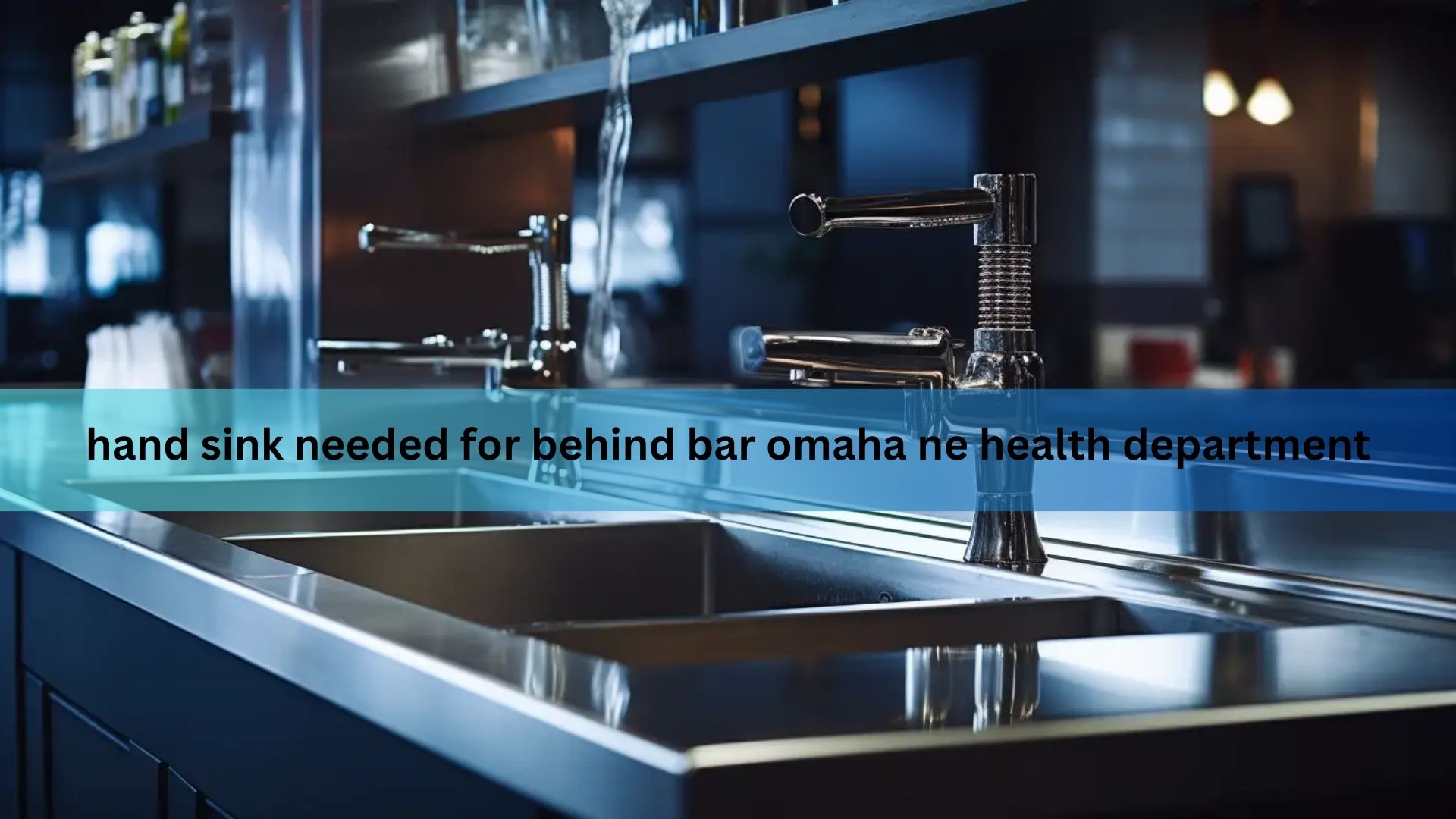Hand Sink Needed For Behind Bar Omaha Ne Health Department
Ensuring proper hand hygiene in food and beverage establishments is essential for public health and safety. In Omaha, Nebraska, this is governed by a combination of state-level regulations and local municipal codes and inspection practices. One critical requirement is the installation of a designated handwashing sink behind the bar—a non-negotiable fixture in maintaining sanitary operations.
Why Does It Matters?
Bartenders and bar staff handle a variety of items—glassware, garnishes, cash, payment devices, and sometimes food items. Without a properly designated hand sink, there’s a heightened risk of cross-contamination, leading to foodborne illness or unsanitary conditions. Separate hand sinks ensure staff wash their hands frequently and correctly, minimizing potential hazards to customers.
State-Level Requirements for Handwashing Sinks in Food Establishments
Nebraska Food Code Requirements
First and foremost, the Nebraska Food Code, which builds upon FDA standards, mandates that food establishments provide a designated handwashing sink equipped with hot and cold running water, hand soap, and disposable towels or hand dryers.Notably, this applies to any food or beverage service area—including bars—where handling food or drink occurs.
Even for temporary or mobile food operations, such as pop-up bars or event setups, the law remains clear: a hand sink must be present, functioning, and stocked appropriately.
Safe Food Handler Practices in Nebraska
Beyond physical fixtures, Nebraska’s Department of Agriculture outlines handwashing protocols: hands must be washed thoroughly with soap and warm water for at least 20 seconds, including rinsing and drying with disposable towels. Signage reminding employees to wash hands should also be posted at the handwashing station..
This reinforces not only the presence of a sink but also its correct usage to maintain food safety standards.
Omaha-Specific Code and Local Enforcement:
Municipal Hygiene Code
Omaha’s municipal code echoes the state mandate, requiring that hand-washing sinks designated solely for cleansing the hands be provided in food processing and manufacturing areas Municode Library. While the language mentions processing and manufacturing, in practice, local health authorities interpret this to include areas where food and beverage preparation occurs—including bars.
The Omaha-Douglas County Health Department serves as the local authority enforcing these regulations, inspecting businesses for compliance and correcting violations Municode Library.
Plan Review and Inspections
Before opening or after remodeling, bar owners typically submit their facility layout to the Nebraska Department of Agriculture or local health officials. Inspectors review the availability and placement of handwashing sinks, ensuring they meet the standard requirements—properly located, equipped, and accessible.
Practical Considerations Behind the Bar:
Placement and Accessibility
A hand sink positioned behind the bar, near where staff work, ensures convenience and encourages frequent use. It should be easily visible, accessible without obstruction, and kept clear of clutter or equipment.
A practical rule: never wash hands in dish or mop sinks—handwashing must occur in a sink clearly designated and equipped for that purpose only.
Equipping the Sink
To comply, the hand sink must have:
- Hot and cold running water (meeting minimum temperatures required by code)
- Hand soap
- Disposable towels or approved hand-drying device
- Signage reminding staff to wash their hands.
In food trucks or temporary setups, equipment is often compact, so a small wall-mounted sink with necessary fixtures and accessories (e.g., soap dispenser, towel holder) is common.
Also Read: Curry Health Center – A Complete Guide In Simple Words!
Why Bars Specifically Need Hand Sinks Behind the Bar?
Multiple Touchpoints, High Risk
Bartenders frequently touch high-contact surfaces—glassware, bottles, cash, payment devices—and may also handle food garnishments. The risk of contamination is high without a designated and convenient handwashing station.
Compliance and Credibility
Beyond health, having a proper sink demonstrates professionalism and adherence to regulations during inspections, and enhances customer confidence in the establishment’s hygiene.
Operational Efficiency
Efficient layout with a dedicated hand sink helps staff incorporate handwashing seamlessly into their routine without having to leave their workstation or access other areas.
Consequences of Non-Compliance:
Health Inspection Violations
If a bar lacks a proper hand sink behind the bar or fails to supply it with soap and disposable towels, it is considered a priority violation—a serious concern that requires immediate correction.
Potential Outcomes
- Fines or financial penalties.
- Mandatory corrections, possible closure until compliance is achieved.
- Re-inspection fees if follow-up audits are required.
- Damage to reputation if publicized.
Given these stakes, most establishments prioritize installing and maintaining compliant handwashing facilities.
Summary: Legal Foundations and Expectations
| Level | Requirement Summary |
| State (Nebraska) | Food Code demands designated hand sink with hot/cold water, soap, towel, signage. |
| Local (Omaha) | Municipal code requires hand-washing sink in food areas; enforced by local health authority. |
| Practical Guidance | Sink must be accessible, stocked, used only for hands, placed behind bar for convenience |
| Enforcement | Violations yield fines, closures, follow-up oversight. |
Recommendations for Bar Owners:
- Install a compliant hand sink behind the bar—ensure hot/cold water, soap dispenser, towel dispenser, and “Wash Hands” sign.
- Check water temperature meets code standards (often minimum 100°F or regionally specified).
- Place clearly and accessibly—so staff don’t need to travel to another room.
- Train staff on proper handwashing technique (20-second scrub, using soap, drying with disposable towels) and reinforce via signage.
- Review your layout during pre-inspection or renovation planning to ensure compliance.
- Maintain supplies consistently—hand soap, towels, signage, and sink functionality should be part of daily checks.
- Respond quickly to any inspection feedback—fix priority violations immediately to avoid closure or fines.
FAQ’s:
1. Is a hand sink required behind a bar in Omaha, NE?
Yes. Omaha follows Nebraska Food Code, which requires a designated handwashing sink in every area where food or drinks are prepared or served, including behind bars.
2. Can bartenders use the dishwashing sink to wash their hands?
No. The law requires a separate hand sink for washing hands only. Dish sinks or mop sinks cannot be used for this purpose.
3. How close does the hand sink need to be?
It should be easily reachable for bar staff without having to leave the work area, so they can wash hands often during their shift.
4. Who checks for the hand sink requirement?
The Omaha-Douglas County Health Department inspects bars and restaurants to make sure they follow all hygiene and safety rules.
5. Do temporary bars or event bars also need a hand sink?
Yes. Even temporary setups must have a hand sink with all required supplies to be approved by health inspectors.
6. Can the sink be used for other tasks like filling pitchers?
No. The sink is for handwashing only—it cannot be used for cleaning tools, filling containers, or dumping drinks.
Final Thoughts:
A hand sink behind the bar is not just a legal checkbox—it’s a frontline defense in maintaining public health and ensuring a safe, hygienic, and trustworthy environment for customers. In Omaha, Nebraska, both state regulations and local health codes affirm that this fixture is mandatory in any food or beverage service area. It reflects a commitment to safety, professionalism, and quality service.
Read More:






